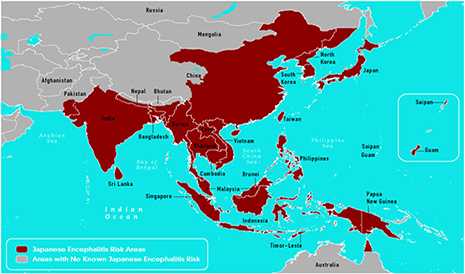Japanese encephalitis (JE) virus is the leading cause of vaccine-preventable encephalitis in Asia and the western Pacific. For most travelers to Asia, the risk for JE is very low but varies based on destination, duration of travel, season, and activities. JE virus is maintained in a cycle involving mosquitoes and vertebrate hosts, mainly pigs and wading birds. Humans can be infected when bitten by an infected mosquito. Most human infections are asymptomatic or result in only mild symptoms. However, a small percentage of infected persons develop inflammation of the brain (encephalitis), with symptoms including sudden onset of headache, high fever, disorientation, coma, tremors and convulsions. About 1 in 4 cases are fatal. There is no specific treatment for JE. Patient management focuses on supportive care and management of complications. Steps to prevent JE include using personal protective measures to prevent mosquito bites and vaccination.
News & Highlights
For Travelers
- Page last reviewed: August 5, 2015
- Page last updated: August 5, 2015
- Content source:


 ShareCompartir
ShareCompartir


